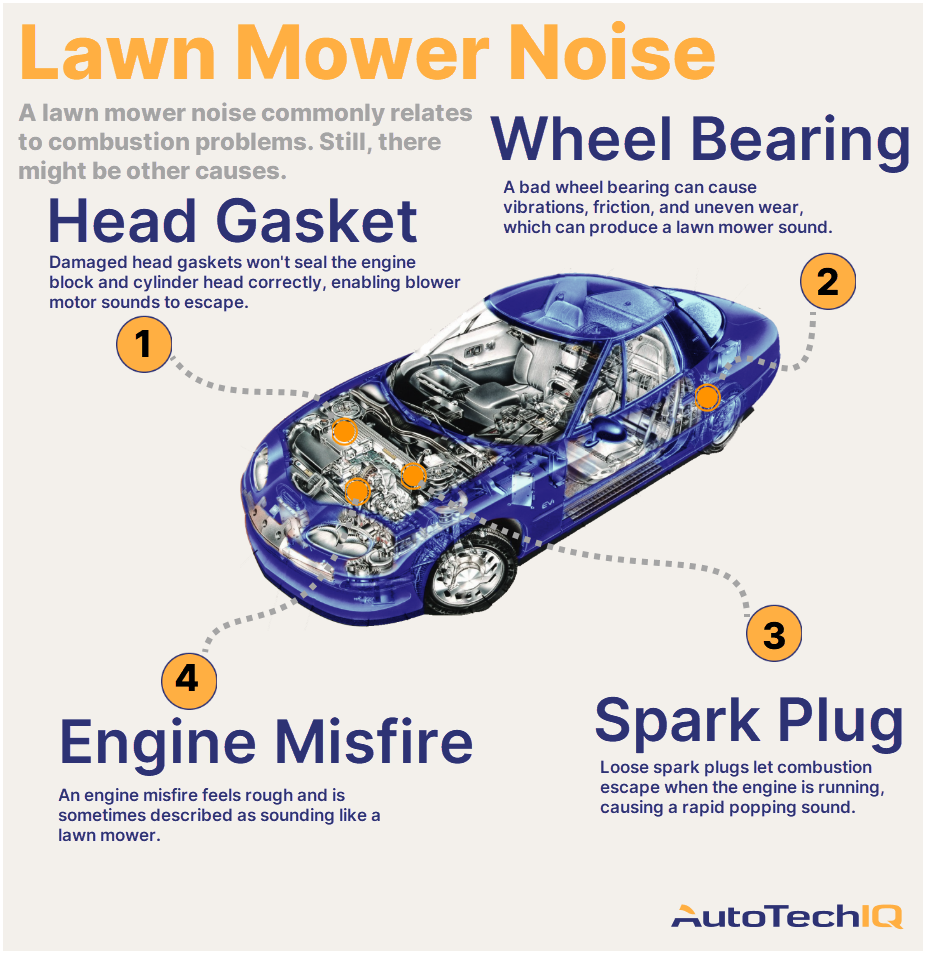A car sounding like a lawn mower can be caused by a damaged or loose exhaust system and can be fixed by repairing or tightening the exhaust components. If the car is still sounding like a lawn mower after fixing the exhaust system, it may be due to issues with the engine, such as a worn-out muffler or a faulty catalytic converter.
Having your car sound like a lawn mower can be a cause for concern and an indicator of underlying issues. Car owners often wonder about the causes of this problem and the possible fixes. Understanding the reasons behind the unusual noise and knowing the potential solutions can help in addressing the problem effectively.
We will explore the common causes of a car sounding like a lawn mower and the steps to remedy this issue.

Credit: www.autotechiq.com
Common Causes
Is your car sounding like a lawn mower? Common causes include issues with the exhaust system, spark plugs, or fuel system. Get to the root of the problem and find the fix to get your car running smoothly again.
Spark Plug Issues
One common cause of a car sounding like a lawn mower is spark plug issues. Faulty or worn-out spark plugs can lead to irregular firing of the engine, producing a rumbling sound.Exhaust System Problems
Issues in the exhaust system can also cause your car to sound like a lawn mower. Leaks or holes in the exhaust pipes or muffler can result in a loud, buzzing noise while driving.Fuel System Troubles
Fuel system troubles, such as clogged fuel filters or a malfunctioning fuel pump, can lead to inadequate fuel delivery to the engine, causing it to sputter and sound like a lawn mower.Common Causes:When your car sounds like a lawn mower, several issues might be at play. Spark plug issues, exhaust system problems, and fuel system troubles are the key culprits. Spark plugs that are worn out or malfunctioning can lead to irregular engine firing, causing a rumbling noise, while exhaust leaks can create a buzzing sound. Additionally, fuel system problems such as clogged filters or a faulty pump can result in inadequate fuel delivery and a sputtering noise.Specific Symptoms
If your car sounds like a lawn mower, there are some potential causes to consider. Common issues include a failing muffler, loose or damaged exhaust pipes, or a worn-out engine. To address these problems, you should inspect and repair the exhaust system, replace the muffler, or seek professional assistance to diagnose and fix any engine-related concerns.
Loud Engine Noise
One of the specific symptoms that indicate your car is sounding like a lawn mower is a loud engine noise. This noise can be quite alarming and can catch the attention of both you and those around you on the road. It is often described as a loud and continuous buzzing or humming sound that is similar to the noise produced by a lawn mower.
A loud engine noise can be caused by various factors, such as a faulty exhaust system, worn-out bearings, or a malfunctioning engine component. It is important to address this issue promptly as ignoring it can lead to more severe damage to your vehicle.
Vibrations While Driving
Vibrations while driving is another specific symptom that may indicate your car is sounding like a lawn mower. These vibrations can be felt in the steering wheel, floorboards, or even the entire vehicle. They are often accompanied by a loud engine noise and can become more pronounced as you accelerate.
The vibrations can be caused by a number of factors, including unbalanced tires, worn-out suspension components, or a damaged drivetrain. It is essential to have these issues inspected and resolved by a professional mechanic to ensure the safety and performance of your vehicle.
Decreased Performance
Another specific symptom to look out for if your car is sounding like a lawn mower is decreased performance. You may notice a drop in acceleration, difficulty in maintaining speed, or a general lack of power when driving. This can be particularly frustrating and can impact your driving experience.
The decreased performance can be attributed to several issues, such as clogged fuel injectors, a malfunctioning fuel pump, or a faulty ignition system. It is crucial to have these components checked and repaired to restore the optimal performance of your car.
Diagnosis Process
When your car starts to sound like a lawnmower, it’s a sign that something is not quite right. The first step in addressing this issue is to perform a thorough diagnosis process to pinpoint the cause of the problem. By listening for clues, conducting a visual inspection, and using diagnostic tools, you can effectively identify and address the issue at hand.
Listening For Clues
Begin the diagnosis process by listening for any telltale sounds that your car may be emitting. Pay close attention to the type of noise the vehicle is producing. Is it a high-pitched whining, a low rumbling, or a sharp knocking? These auditory clues can provide valuable insight into the underlying issue. Take note of when the sound occurs, such as during acceleration, idling, or while turning. This information will help narrow down the potential causes of the problem.
Visual Inspection
A visual inspection of the vehicle can also reveal important clues about the source of the lawnmower-like noise. Check the exhaust system for any visible damage or loose components. Inspect the engine bay for signs of leaks, worn belts, or damaged pulleys. Additionally, examine the underside of the car for any loose or damaged components that may be contributing to the unusual sound. By visually assessing the condition of the vehicle, you can gain valuable insights into potential issues that may be causing the noise.
Using Diagnostic Tools
In some cases, it may be necessary to utilize diagnostic tools to further pinpoint the cause of the abnormal noise. OBD-II scanners can be used to check for any stored error codes that may indicate specific issues with the engine or emissions system. Additionally, specialty tools such as stethoscopes and vibration sensors can help locate specific sources of noise within the engine or vehicle components. By leveraging diagnostic tools, you can efficiently identify the root cause of the lawnmower-like sound and take appropriate corrective measures.

Credit: knowhow.napaonline.com
Diy Fixes
When your car starts sounding like a lawn mower, it can be frustrating and worrying. Luckily, there are some DIY fixes you can try to troubleshoot and solve this issue.
Replacing Spark Plugs
If your car sounds like a lawn mower, worn-out or dirty spark plugs could be to blame. Here’s a simple guide to replacing spark plugs:
- Locate the spark plugs by referring to the owner’s manual or seeking assistance from a knowledgeable individual.
- Disconnect the spark plug wires and remove the old plugs using a socket wrench.
- Check the gap of the new spark plugs to ensure they match the manufacturer’s specifications.
- Install the new plugs and reconnect the plug wires securely.
Checking And Repairing Exhaust Pipes
A problematic exhaust system can also cause a lawn mower-like sound in your car. Here are some DIY steps to check and repair exhaust pipes:
- Visually inspect the exhaust pipes and muffler for any visible damage or rust.
- If you notice any holes or damage, use a muffler repair kit or high-temperature epoxy to seal the affected areas.
- If the exhaust system is excessively damaged, it’s advisable to seek professional assistance.
Cleaning Fuel Injectors
Dirty or clogged fuel injectors can contribute to rough engine performance and unusual sounds. Follow these steps to clean your car’s fuel injectors:
- Obtain a high-quality fuel system cleaner specifically designed to clean injectors.
- Pour the cleaner into your car’s gas tank according to the product’s instructions.
- Drive your car to allow the cleaner to circulate through the fuel system and clean the injectors.
- Repeat this process as recommended by the cleaner’s instructions to ensure thorough cleaning.
By following these DIY fixes, you can potentially resolve the issue of your car sounding like a lawn mower. However, if the problem persists, it’s advisable to have your car inspected by a professional mechanic.
Professional Solutions
When your car starts sounding like a lawnmower, it’s time to consider professional solutions to fix the issue. While there are some DIY methods you can try, it’s always best to consult a mechanic for a thorough inspection and precise resolution. Here are the top professional solutions that can help you get rid of the lawnmower-like noise.
Visit To Mechanic
If your car is producing a sound similar to a lawnmower, the first step is to schedule a visit to a skilled mechanic. A professional will have the expertise to diagnose the root cause of the noise and provide an effective remedy. Remember, it’s crucial to address the issue promptly to prevent any further damage to your vehicle.
Engine Tune-up
An engine tune-up is often an essential step in eliminating the lawnmower-like sound from your car. During this procedure, the mechanic will inspect and clean various components of your engine, including spark plugs, ignition coils, fuel injectors, and filters. They will also check for any issues with timing or compression. By tuning up your engine, you can restore its optimal performance and reduce unwanted noises.
Exhaust System Inspection
The exhaust system plays a significant role in the overall noise reduction of your vehicle. If your car sounds like a lawnmower, it’s essential to have the exhaust system inspected by a professional. They will check for any leaks, blockages, or damaged components, such as the muffler or catalytic converter. Repairing or replacing faulty exhaust parts can go a long way in restoring the smooth and quiet operation of your car.
By seeking professional solutions, such as visiting a mechanic, getting an engine tune-up, and inspecting the exhaust system, you can effectively tackle the lawnmower-like sound coming from your car. Remember, prompt action is key to maintaining the health and performance of your vehicle. So, don’t hesitate to consult a professional and get your car back in top-notch condition.

Credit: www.autotechiq.com
Preventive Measures
Preventive Measures to Keep Your Car from Sounding Like a Lawn Mower:
Regular Maintenance Checks
Regularly scheduled maintenance checks help detect issues early, preventing bigger problems down the road.
Quality Fuel Usage
Ensure you use quality fuel from reputable sources to keep your engine running smoothly.
Avoiding Overheating
Prevent engine overheating by monitoring coolant levels and ensuring proper ventilation.
Safety Tips
Experiencing your car sounding like a lawn mower can be concerning, but there are some common causes and fixes to address the issue. Regular maintenance such as changing the spark plugs, cleaning the air filter and checking the exhaust system can help resolve the problem.
Additionally, using high-quality fuel and keeping the engine well-tuned can prevent this issue from occurring.
Wearing Protective Gear
Always ensure to wear appropriate protective gear such as gloves and safety glasses while working on your car.
Avoiding Diy If Uncertain
If you are uncertain about the issue, it is wise to seek professional help instead of attempting a DIY fix.
Properly Maintaining Safety Tools
Regularly check and maintain your safety tools and equipment to ensure they are in good working condition.
Conclusion
To conclude, addressing the causes and fixes for a car sounding like a lawn mower is crucial for maintaining vehicle performance and reducing potential damages. By regularly checking and maintaining the exhaust system, spark plugs, and air filters, you can prevent such issues.
Additionally, understanding the importance of timely repairs and seeking professional help when necessary will keep your car running smoothly and sounding as it should. Stay attentive to your vehicle’s symptoms to ensure a quiet and efficient ride.


